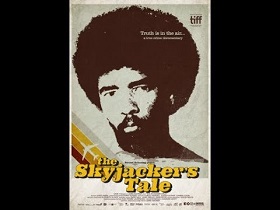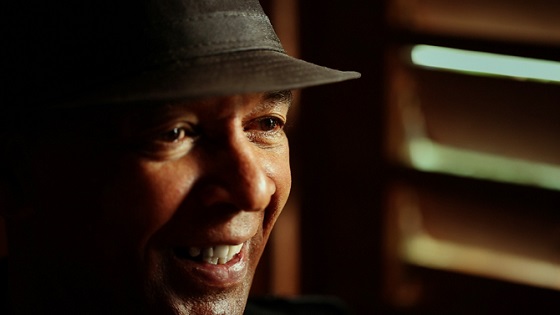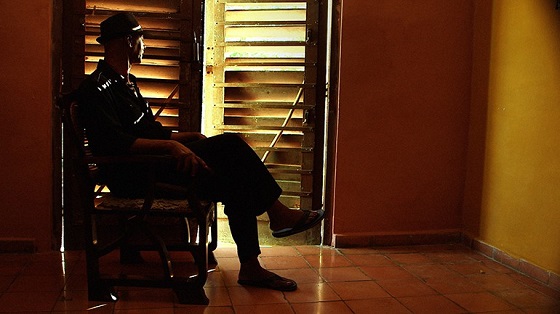A deep dive investigation into a series of shocking crimes that has largely faded from memory outside of the Caribbean, The Skyjacker’s Tale does what documentary features do best: it encourages a person to think critically. The story of an infamous mass murder and the subsequent airline hijacking by one of the men convicted of that crime, the film doesn’t flinch when examining the social, racial, and political components of the whole ordeal. And while no concrete conclusions are reached as a result of the effort, information does come to light that puts a new spin on what happened. In this way, director Jamie Kastner is undeniably successful, for he’s given audiences enough information to allow them to critically analyze a series of events whose implications stretch far beyond the reach of the crimes discussed.
The Skyjacker’s Tale deals primarily with Ishmael Muslim Ali, a convicted murderer and fugitive who currently resides in Cuba. Ali, along with four other men, were sentenced to life terms for the 1972 murder of eight people at a St. Croix country club. All five men proclaimed their innocence after recanting their confessions, yet only Ali was able to escape custody after more than a decade behind bars, when he managed to take control of a commercial airliner and force its landing in Cuba. Once there, Ali asked for and received asylum, and has been enjoying a quiet retirement of sorts for the last thirty-plus years.
Kastner splits his documentary between recreations, conversations with Ali in Cuba, and a series of talking head interviews with the lawyers, policemen, and other people involved in Ali’s murder trial and airline hijacking. On the one hand, there are those that think that Ali, perpetually in and out of trouble for most of his life, is undeniably one of those responsible for the 1972 murders. On the other side of things, there’s Ali and his defenders, who claim that a corrupt Virgin Islands police force, politically motivated judiciary, and forced torture-confessions predetermined the murder trial’s outcome.
There’s a considerable amount of circumstantial evidence on both sides, yet little in the way of smoking guns or other undeniably incriminating facts. Ali had a background in political agitation and makes no apologies about the fact that as a young man he did indeed go after affluent white tourists when seeking out robbery targets (and the victims of the mass slaying happened to be just that). Ali and his cohorts had a history of petty theft and other criminal activity, so they were a natural target for the investigators of the robbery-turned-mass murder when suspects were sought.
Yet St. Croix and the Virgin Islands doesn’t lend itself to easy conclusions, and a long history of racial and class warfare between residents and visitors (exploiters?) of the region throws a wrench into everything. The Virgin Islands have an extensive history of diametrically opposed classes that go back to the slavery era, and when the U.S. territory experienced an economic boom in the 20th century, these disparities seemed to set as if in concrete. By the 1970s, tension between the predominantly white visitors enjoying the island’s picturesque villas and beaches, and the overwhelmingly black working class in their employ, had reached a fever pitch.
During his interviews, Ali talks about this division, and claims that the police force and political establishment of St. Croix had a vested interest in maintaining the image of the island as a carefree playground for the rich. The racial and economic imbalance on the island had to remain intact to keep the tourist dollars inbound, and as a result, justice for the massacre needed to be swift to reassure the rich folk. Kastner speaks with several of the St. Croix police officers involved in the investigation, and while they don’t admit to fabricating evidence, one of them does make it clear that things like that did indeed happen. Ali has remained steadfast over the years that he had nothing to do with the murders, and only committed the subsequent skyjacking so that he could escape his unjust imprisonment.
It’s a complicated mess, really, and one that doesn’t lend itself to easy conclusions. While it seems borderline outlandish that Ali and his co-defendants are innocent considering they did in fact confess at one time (only to later recant), the history of police violence and coercion does lift a few eyebrows. There were never any other suspects for the crime, nor a repeat of the violence after the authorities arrested Ali and his cohorts, yet a lack of hard evidence (fingerprints, murder weapons, eye witness testimony) made for a very thin case in retrospect.
Ali’s skyjacking of a plane more than a decade later also doesn’t fit the M.O. of a man who had ruthlessly murdered eight people, as witnesses to that event all attest to the fact that their captor was nothing but cordial, calm, and polite. In interviews, Ali comes across as a foul-mouthed teddy bear, and a devoted husband and grandfather: hardly what one would expect out of a murderer. Through all of this, Kastner presents the history behind the key events and principals involved, yet wisely steps back to allow the audience to draw their own conclusions. While it is undeniable that eight innocent people died in 1972, who is responsible and whether Ali still deserves to be in prison (whether innocent or guilty) are the big question marks.
Opening this week, The Skyjacker’s Tale is a captivating investigation of race and class in the Caribbean, as well as an informative unpacking of what it means to reform and mature. At a brisk 75 minutes, the documentary efficiently moves through a stunning amount of social and personal history and offers up a complicated and captivating look at the intersection of race, class, and politics on a small island full of big implications.









Comments on this entry are closed.